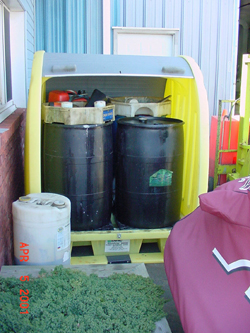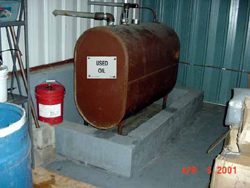|
|
|
Sections
|
|
|
|
|
|
|
|
|
|
|
|
|
|
|
|
|
|
Used
crankcase oil,
automatic transmission fluid, power steering fluid and hydraulic
fluid are all considered used oil and can be mixed and managed together.
|
New York Sea Grant's
Marina Pollution Prevention Web Site
Section 1: Mechanical Activities
-
Oil Changes
Potential Environmental Impacts
Even small amounts of oil introduced into the marine environment
can cause problems, especially if they persist.
Although some oil that spills into the water evaporates, petroleum
hydrocarbons can remain suspended in the water column, concentrate
on the surface, or settle to the bottom. Because of the properties
of oil, a cup of oil can spread a very thin sheen over more than
an acre of calm water. An oil sheen can block necessary oxygen
and light from moving through the surface of the water. According
to the EPA, the hydrocarbons in oil harm juvenile fish, upset
fish reproduction, and interfere with the growth and reproduction
of bottom-dwelling organisms.
Best
Management Practices
- Do not mix
used oil with anything else, such as chlorinated solvents, or
expose oil to electrical contact cleaner or carburetor cleaner
which can contaminate used oil while in an engine. Doing so will
result in the need to perform a hazardous waste determination
on the used oil mixture to establish whether or not the mixture
must be managed as a hazardous waste.
- Purchase
a non-spill vacuum-type or dripless pump system ( for examples
of equipment and suppliers, click
here) for spill-proof oil changes, or to suction
oily water from bilges.
- Slip a plastic
bag over used oil filters prior to removal to prevent drips.
- Burn your
used oil in a used oil fuel space heater (for a list of
manufacturers, click
here). This is also a cost saving measure that
eliminates the cost of waste oil removal and can extend maintenance
activities through the winter. For more information on burning
used oil in space heaters, click
here.
- Recycle used
oil filters. Puncture and drain them first. Collect the drained
used oil and manage according to the regulations (click
here for compliance requirements in New York). If you
generate large numbers of filters, consider purchasing a filter
crusher.

- Install collection
facilities for used oil and used oil filters and encourage boaters
to use them, or direct boaters to their municipal used oil collection
facility, usually at local transfer station. Post signs indicating
how important it is that the used oil not be contaminated. Consider
providing separate tanks for used oil, one for patrons to use
and a secure tank for used oil collected by marina facility staff.
For details on used oil storage compliance requirements,
click
here.
- Store used
oil in tanks or closed containers labeled "USED OIL."
This is also a requirement under the used oil regulations.

- Make sure
your used oil storage tanks or drums have proper containment in
case there is a leak or spill. For examples of available storage
and containment products, click
here.
- Inspect your
used oil storage tanks or drums on a regular basis for leaks or
spills. This is a regulatory requirement.
- Use large
drum funnels or fill tubes when filling used oil drums.
- If you have
to service a boat or other water craft on-site, try to prevent
spills. Do all servicing on impervious surface. If spills do occur,
clean up oil spills with rags. After wringing out the saturated
rag into the used oil drum, have the rags laundered with an industrial
or commercial laundry service. See section entitled Rags
(click here)
for requirements.
- Use oil absorbent
materials to clean up small drips and spills. Sell oil absorbent
pads in the ships store.
- Educate customers
and staff to not use soaps and detergents to clean up oily drips
and spills.
- Avoid pumping
bilge water that is oily or has a visible sheen. Use oil absorbent
materials or an oil/water separator to remove oil before pumping.
- Consider
purchasing a portable or stationary oil/water separator to
clean bilge water (for examples, click
here). These devices draw contaminated water from
bilges, capture hydrocarbons in a filter and discharge clean water.
Regulatory
Issues
- Used oil,
and any materials used to clean a spill, must be managed in accordance
with the federal [40 CFR 279, click
here] and state requirements (For New York State
requirements, click
here).
- Storage of
used oil is subject to all applicable federal Spill Prevention,
Control and Countermeasures (SPCC) [40 CFR 112] click
here. If you store oil in an above ground tank
larger than 660 gallons or store more than a total of 1320 gallons
of petroleum product (including used oil) in above ground tanks
you may be require to have a federal Spill Prevention, Control
and Countermeasure plan for you facility (for more information
on the federal program for marinas, click
here). For a sample SPCC plan, click
here, pdf.
- If there
is a stormwater discharge from your facility and any used oil
may come into contact with precipitation you may have to register
for a General Permit for the Discharge of Storm Water Associated
with Industrial Activity ("Storm Water General Permit").
For more information on storm water permitting in New York,
click
here.
- Oily bilge
water or any petroleum product that is discharged to the waters
of the state must be reported to the state (In New York call the
NYSDEC Oil Spill Hotline at (800) 457 7362)
- If oily bilge
water or any petroleum product that is discharged into navigable
waters causes a visible sheen, it may also be necessary to report
the discharge to the National Response Center at (800) 424-8802.
- The use of
dispersants, such as dishwashing soaps or detergents, on a fuel
spill or sheen of any size on the surface water is prohibited
in most circumstances [40 CFR 110.4] click
here. Dispersants may only be used with permission
from federal or state authorities, and only in rare instances.
|
|

